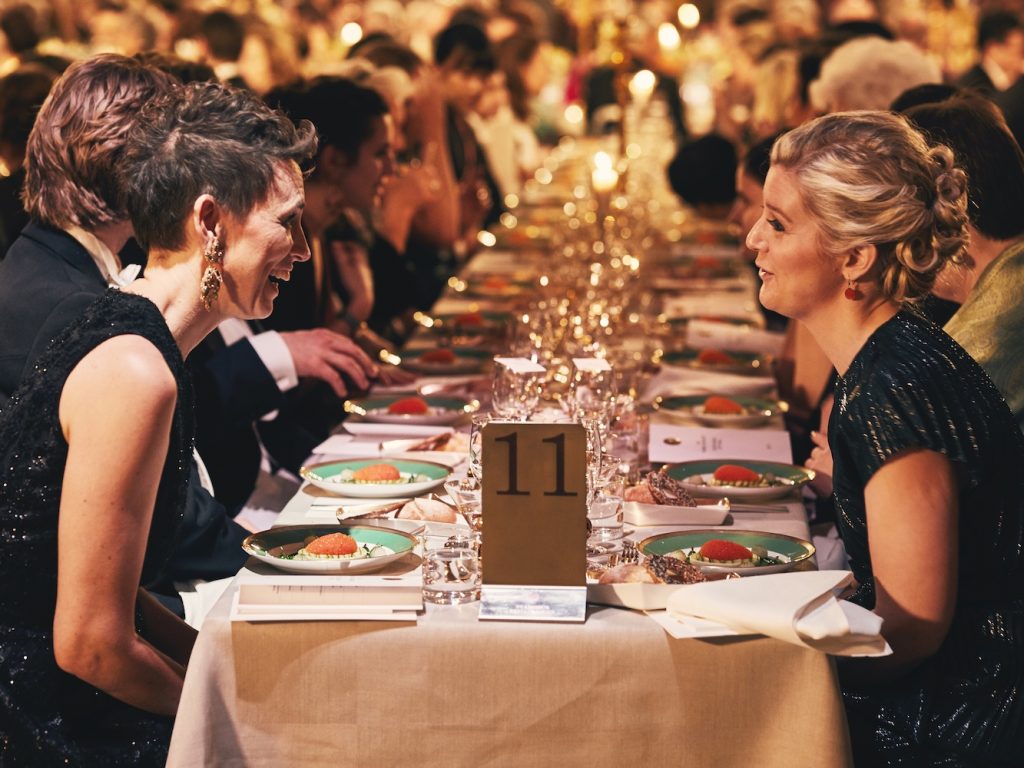
© Nobel Media. Foto: Dan Lepp.
“I believe that, particularly these days when we have to keep ourselves separated from one another, many people are missing the conversations around the dinner table with family and friends,” says Clara Åhlvik, Head of Exhibitions at Nobel Prize Museum. “The dinner table is a place where we can be together, engage in discussion and exchange ideas. In this exhibition we’ll be celebrating the significance of the shared meal for us as individuals and as a society.”
Nobel Day, with its celebratory dinner in Stockholm City Hall, like many other ceremonial banquets, follows traditions that extend as far back in time as the Middle Ages. But now that it is televised and the general public is invited to follow the course of events, the Nobel Banquet has become something of cultural phenomenon.
“We know people gather in all kinds of exciting, festive ways to celebrate Nobel Day,” says Åhlvik. “It could be on the sofa at home, at school or at work. We’re curious about what happens at all those gatherings, and we’d love for everyone who celebrates Nobel Day to share their own stories, pictures and experiences.”
The Nobel Banquet is the point of departure for the exhibition, which opens in December, but it will also tie into other important mealtime rituals. One example is Cambridge University, where meals are given a central role in fostering creative discussions that transcend borders, which the university believes has been a key component in significant research achievements. Another example is the Swedish organisation United Invitations, which brings together people who want to improve their Swedish with others who speak the language fluently for conversation over a home-cooked dinner.
Here’s how it works
Do you celebrate Nobel Day at home in front of the TV? Do you invite family or friends over to eat together? Do you wear your best party dress or a formal dinner jacket? Do you do anything particularly festive in setting the table? Do you prepare a special menu for the occasion? What do you talk about over dinner? Do you have photos to share with us, or perhaps a special object you can lend us that features prominently in your own Nobel Banquet? We’d love it if you would share your pictures and stories with us.
Share through
Facebook: facebook.com/nobelprizemuseum
Instagram: instagram.com/nobelprizemuseum
Email: nobelmiddagen.nobelprizemuseum@nobelprize.org
About Nobel Prize Museum
The Nobel Prize shows that ideas can change the world. The courage, creativity and perseverance of the Nobel Laureates inspire us and give us hope for the future. Videos, in-depth guided tours and donated artefacts tell about the Laureates and their contributions for the greatest benefit to humankind. Based on the Nobel Prize’s unique combination of fields – natural sciences, literature and peace – we examine the great issues of our time and show how we can respond to them with science, humanism and cooperation. Through our exhibitions, school programmes, lectures and dialogues, we at the Museum would like to generate public engagement for a better world. Today we are located at Stortorget in Gamla Stan, Stockholm’s Old Town district. We are planning to create a new home for our public outreach activities at Slussen in downtown Stockholm.
For further information
press@nobelprize.org